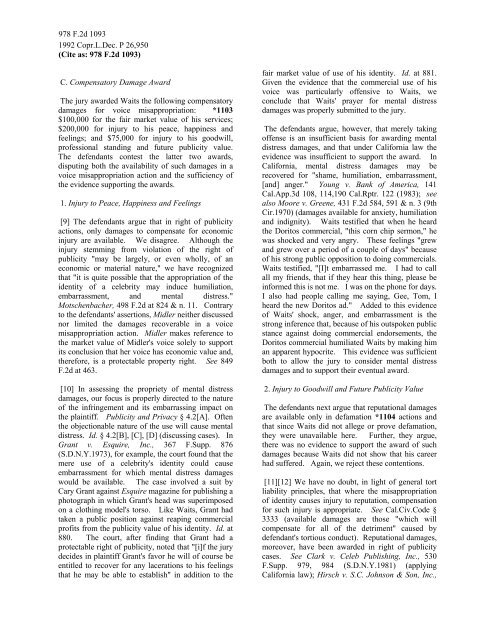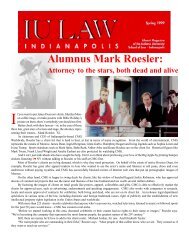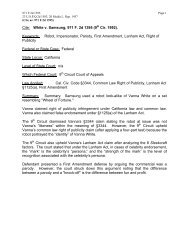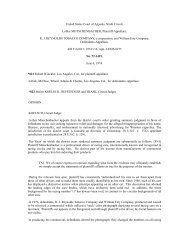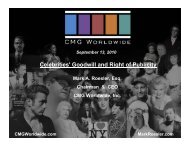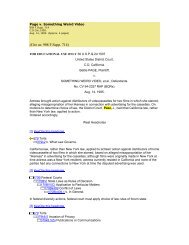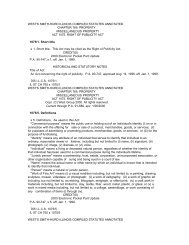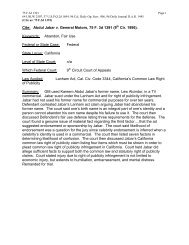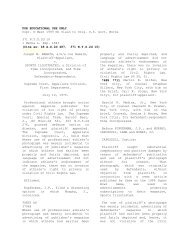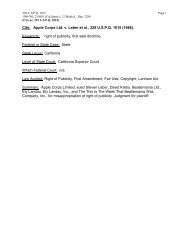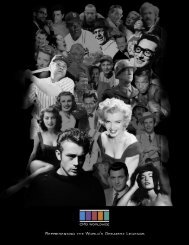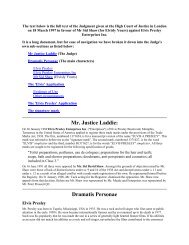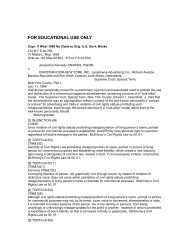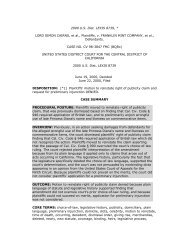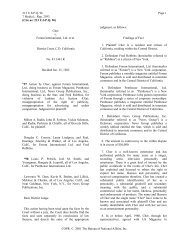Cite: Waits v. Frito Lay, 978 F. 2d 1093 (9th Cir. 1992 ... - Mark Roesler
Cite: Waits v. Frito Lay, 978 F. 2d 1093 (9th Cir. 1992 ... - Mark Roesler
Cite: Waits v. Frito Lay, 978 F. 2d 1093 (9th Cir. 1992 ... - Mark Roesler
You also want an ePaper? Increase the reach of your titles
YUMPU automatically turns print PDFs into web optimized ePapers that Google loves.
<strong>978</strong> F.<strong>2d</strong> <strong>1093</strong><br />
<strong>1992</strong> Copr.L.Dec. P 26,950<br />
(<strong>Cite</strong> as: <strong>978</strong> F.<strong>2d</strong> <strong>1093</strong>)<br />
C. Compensatory Damage Award<br />
The jury awarded <strong>Waits</strong> the following compensatory<br />
damages for voice misappropriation: *1103<br />
$100,000 for the fair market value of his services;<br />
$200,000 for injury to his peace, happiness and<br />
feelings; and $75,000 for injury to his goodwill,<br />
professional standing and future publicity value.<br />
The defendants contest the latter two awards,<br />
disputing both the availability of such damages in a<br />
voice misappropriation action and the sufficiency of<br />
the evidence supporting the awards.<br />
1. Injury to Peace, Happiness and Feelings<br />
[9] The defendants argue that in right of publicity<br />
actions, only damages to compensate for economic<br />
injury are available. We disagree. Although the<br />
injury stemming from violation of the right of<br />
publicity "may be largely, or even wholly, of an<br />
economic or material nature," we have recognized<br />
that "it is quite possible that the appropriation of the<br />
identity of a celebrity may induce humiliation,<br />
embarrassment, and mental distress."<br />
Motschenbacher, 498 F.<strong>2d</strong> at 824 & n. 11. Contrary<br />
to the defendants' assertions, Midler neither discussed<br />
nor limited the damages recoverable in a voice<br />
misappropriation action. Midler makes reference to<br />
the market value of Midler's voice solely to support<br />
its conclusion that her voice has economic value and,<br />
therefore, is a protectable property right. See 849<br />
F.<strong>2d</strong> at 463.<br />
[10] In assessing the propriety of mental distress<br />
damages, our focus is properly directed to the nature<br />
of the infringement and its embarrassing impact on<br />
the plaintiff. Publicity and Privacy § 4.2[A]. Often<br />
the objectionable nature of the use will cause mental<br />
distress. Id. § 4.2[B], [C], [D] (discussing cases). In<br />
Grant v. Esquire, Inc., 367 F.Supp. 876<br />
(S.D.N.Y.1973), for example, the court found that the<br />
mere use of a celebrity's identity could cause<br />
embarrassment for which mental distress damages<br />
would be available. The case involved a suit by<br />
Cary Grant against Esquire magazine for publishing a<br />
photograph in which Grant's head was superimposed<br />
on a clothing model's torso. Like <strong>Waits</strong>, Grant had<br />
taken a public position against reaping commercial<br />
profits from the publicity value of his identity. Id. at<br />
880. The court, after finding that Grant had a<br />
protectable right of publicity, noted that "[i]f the jury<br />
decides in plaintiff Grant's favor he will of course be<br />
entitled to recover for any lacerations to his feelings<br />
that he may be able to establish" in addition to the<br />
fair market value of use of his identity. Id. at 881.<br />
Given the evidence that the commercial use of his<br />
voice was particularly offensive to <strong>Waits</strong>, we<br />
conclude that <strong>Waits</strong>' prayer for mental distress<br />
damages was properly submitted to the jury.<br />
The defendants argue, however, that merely taking<br />
offense is an insufficient basis for awarding mental<br />
distress damages, and that under California law the<br />
evidence was insufficient to support the award. In<br />
California, mental distress damages may be<br />
recovered for "shame, humiliation, embarrassment,<br />
[and] anger." Young v. Bank of America, 141<br />
Cal.App.3d 108, 114,190 Cal.Rptr. 122 (1983); see<br />
also Moore v. Greene, 431 F.<strong>2d</strong> 584, 591 & n. 3 (<strong>9th</strong><br />
<strong>Cir</strong>.1970) (damages available for anxiety, humiliation<br />
and indignity). <strong>Waits</strong> testified that when he heard<br />
the Doritos commercial, "this corn chip sermon," he<br />
was shocked and very angry. These feelings "grew<br />
and grew over a period of a couple of days" because<br />
of his strong public opposition to doing commercials.<br />
<strong>Waits</strong> testified, "[I]t embarrassed me. I had to call<br />
all my friends, that if they hear this thing, please be<br />
informed this is not me. I was on the phone for days.<br />
I also had people calling me saying, Gee, Tom, I<br />
heard the new Doritos ad." Added to this evidence<br />
of <strong>Waits</strong>' shock, anger, and embarrassment is the<br />
strong inference that, because of his outspoken public<br />
stance against doing commercial endorsements, the<br />
Doritos commercial humiliated <strong>Waits</strong> by making him<br />
an apparent hypocrite. This evidence was sufficient<br />
both to allow the jury to consider mental distress<br />
damages and to support their eventual award.<br />
2. Injury to Goodwill and Future Publicity Value<br />
The defendants next argue that reputational damages<br />
are available only in defamation *1104 actions and<br />
that since <strong>Waits</strong> did not allege or prove defamation,<br />
they were unavailable here. Further, they argue,<br />
there was no evidence to support the award of such<br />
damages because <strong>Waits</strong> did not show that his career<br />
had suffered. Again, we reject these contentions.<br />
[11][12] We have no doubt, in light of general tort<br />
liability principles, that where the misappropriation<br />
of identity causes injury to reputation, compensation<br />
for such injury is appropriate. See Cal.Civ.Code §<br />
3333 (available damages are those "which will<br />
compensate for all of the detriment" caused by<br />
defendant's tortious conduct). Reputational damages,<br />
moreover, have been awarded in right of publicity<br />
cases. See Clark v. Celeb Publishing, Inc., 530<br />
F.Supp. 979, 984 (S.D.N.Y.1981) (applying<br />
California law); Hirsch v. S.C. Johnson & Son, Inc.,


